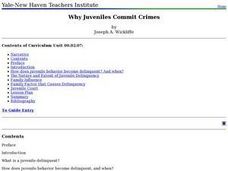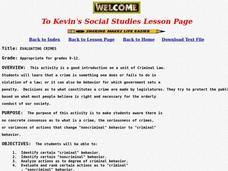Curated OER
Science in the Court Room
Share their opinions on the use of DNA databases in criminal investigations. After reading an article, they evaluate the pros and cons of the databases and work in groups to answer discussion questions. They write a letter to a state...
Curated OER
Evaluating Crimes
What is crime? Discriminate between criminal and non-criminal behavior with your scholars by engaging them in potentially heated discussion about various scenarios. A brief definition of the word crime precedes individual analysis of 15...
Curated OER
The Sentencing Activity
Students simulate a trial where a crime has been committed and a judge decides on the sentencing. In this trial lesson plan, students discuss why boys and girls may view crimes differently.
Curated OER
Why Juveniles Commit Crimes
High schoolers examine the reasons why juveniles commit crimes. As a class, they watch movies showing juveniles committing crims and discuss the impact on societies. They take a field trip to adult and juvenile courts and compare their...
Curated OER
A Cultural Defense to Crime?
Students define a "defense to a crime" and identify various defenses to crimes in Utah. They examine "cultural defense" and apply it to case studies.
Curated OER
The Youth Criminal Justice Act
Students review the Youth Criminal Justice Act and examine the consequences for young people who commit crimes. They investigate the rehabilitation and reintegration processes associated with the act.
Curated OER
Evaluating Crimes
Young scholars studey that a crime is something one does or fails to do in violation of a law; or it can also be behavior for which government sets a penalty. penalty.








